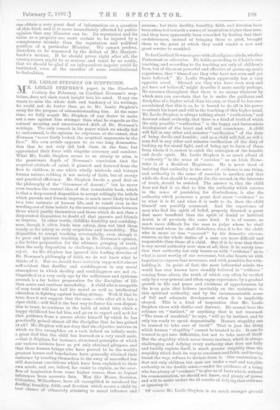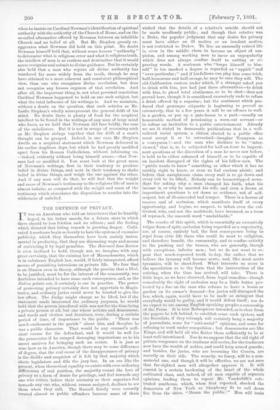MR. LESLIE STEPHEN ON SCEPTICISM.
MR. LESLIE STEPHEN'S paper, in the Nineteenth Century for February, on Cardinal Newman's scep- ticism, does not show much insight into his mind. If any one wants to miss the whole drift and tendency of his writings, he could not do better than go to Mr. Leslie Stephen's essay for the purpose of misunderstanding him. At the same time, we fully acquit Mr. Stephen of any desire to make out a case against him stronger than what he regards as the natural meaning and uucaricatured drift of Dr. Newman's writings. The only remark in his paper which we wholly fail to understand, is the opinion he expresses at the outset, that Newman "never fairly looked the sceptical arguments in the face." His own article appears to us one long demonstra- tion that he not only did look them in the face, but appreciated their force with singular accuracy and candour. What Mr. Leslie Stephen seems to us utterly to miss, is the passionate depth of Newman's conviction that the sceptical attitude of mind, if planted and fostered from the first in children, is one which wholly misleads and betrays human nature, robbing it not merely of faith, but of energy and practical efficiency. Mr. Stephen dwells a good deal on the philosophy of the " Grammar of Assent ;" but he never even touches the central idea of that remarkable book, which is that a deep-rooted disposition to accept willingly the beliefs which parents and friends impress, is much more likely to lead to a true estimate of human life, and to result even in the weeding-out of false beliefs by the natural competition between those which justify themselves and those which do not, than a deep-rooted disposition to doubt all that parents and friends so impress. In other words, childlike humility and confiding- ness, though it often leads men astray, does not lead them nearly so far astray as early scepticism and incredulity. The disposition to accept teaching reverentially, even though it be poor and ignorant teaching, is, in Dr. Newman's opinion, a far better preparation for the ultimate grasping of truth, than the early disposition to challenge, hesitate, dispute, and reject. As Mr. Stephen has ignored this leading doctrine of Dr. Newman's philosophy of faith, we do not know what he thinks of it. But we should have certainly supposed it almost self-evident that docility and confidingness in any moral atmosphere in which docility and confidingness are not ex- tinguished at a very early age by the selfishness and cynicism around, is a far better preparation for the discipline of life than acute and cautious incredulity. A child who is incapable of easy trust will lose half his moral as well as intellectual education in fighting against leading-strings. Well, if that be true, does it not suggest that the man,—who after all is but a riper child,—will find it the best way to foster his own disposi- tion to trust, to continue in the habit of mind into which a happy childhood has led him, and go on to expect and seek for that guidance from a source above himself by which he has practically gained almost all the discipline that he has gained at all P Mr. Stephen will not deny that the objective universe in which we live exemplifies on a vast, indeed an infinite scale, a great deal that the, child has learned on a very small scale, —that it displays, for instance, structural principles of which our various sciences have as yet only obtained glimpses, and that those human beings who have proved to be the world's greatest heroes and benefactors have generally attained their eminence by trusting themselves to the sway of unverified but still dominant convictions which have been explained to their own minds, and are, indeed, far easier to explain, as the over- flow of inspiration from some higher source, than as logical inferences from accurate data. Men like Moses, Socrates, Columbus, Wilberforce, have all exemplified in manhood the docility, humility, faith, and devotion which secure a child its best chance of ultimately attaining to moral influence and success ; but their docility, humility, faith, and devotion have been attracted towards a source of inspiration higher than man, and they have apparently been rewarded by finding that their credulousness, instead of bringing them to grief, brought them to the point at which they could render a new and great service to mankind.
So far Cardinal Newman goes with all religious minds, whether Protestant or otherwise. He holds, according to Christ's own teaching, and according to the teaching not only of children's lives, but of the most powerful and effective of grown-up men's experience, that " blessed are they who have not seen and yet have believed." Mr. Leslie Stephen apparently has a very opposite creed. ` Blessed are they who have even seen and yet have not believed,' might describe it more nearly perhaps. He assumes throughout that there is no means whatever by which man can ascertain that he is under the guidance and discipline of a higher mind than his own, or that if lie has once ascertained that this is so, he is bound to do all in his power to submit his heart and will to the teaching of this higher mind. Mr. Leslie Stephen is always talking about " verification," and does not admit evidently, that there is a kind of truth of which the only possible " verification " is the happy and harmonious development of the heart and will and conscience. A child will fail in any other and minuter " verification " of the duty of being docile and humble : and as a child will fail, so will a man fail in any other and minuter verification of the duty of looking up for moral light, and of being apt to learn of those from whom it is easiest to catch the contagion of the humble and docile spirit. Mr. Leslie Stephen is as much afraid of " authority " in the sense of " coercion " as an Irish Home- ruler is of a Resident Magistrate. He is never tired of insisting that authority in the sense of evidence is one thing, and authority in the sense of coercion is another, and that while the first should be sought for, the second, in the interests of truth, should be resisted. The answer is, that the child does not find it so, that to him the authority which coerces in the sense of punishing for disobedience, is also the authority which possesses a great deal more " evidence " as to what it is fit and what it is unfit to do, than the child himself can possibly command. And the experience of men who find the spirit of belief, properly directed, a great deal more beneficial than the spirit of denial or habitual doubt, is of precisely the same kind. It is, of course, as much more difficult for the man to judge whom he shall believe and whom he shall disbelieve, than it is for the child, who is more or less " coerced " by his domestic circum- stances, as the whole duties of a man are more difficult and responsible than those of a child. But if it be true that there is any moral authority over men at all, then it is surely true that that authority not only besets us with "evidence" as to what is most worthy of our reverence, but also besets us with impulses to express that reverence, and with penalties for with- holding it. In point of fact, the most influential minds the world has ever known have steadily believed in "evidence" coming from above, the truth of which can often be verified only by a very general and often vague experience, by a gradual growth in life and peace and vividness of apprehension, by the keen pain that follows inevitably on the resistance to this spiritual authority, and by the incommunicable sense of full and adequate development when it is implicitly obeyed. This is a kind of inspiration that Mr. Leslie Stephen views with dislike and distrust. He cannot bear the reliance on " instinct," or anything that is not reasoned. " The mass of mankind," he says, "will go by instinct, and be only too ready to speak dogmatically. Human stupidity can be trusted to take care of itself." That is just the thing which human " stupidity" cannot be trusted to do. It can 'be trusted to get into difficulties, but not to take care of itself. But the stupidity which never trusts instinct, which is always challenging and defying every authority that does not fully and lucidly explain itself, is much greater stupidity than the stupidity which feels its way to reverence and faith, and having found the way, refuses to deviate from it. Our contention is, that not only children but men are under a real and tangible authority in the double sense,—under thegancitds hawneeiohof, without
being who has plenty of "evidence" to
his communication, we should not know, and plenty of power and will to make us feel the ill results of defying that evidence or ignoring it.
Of course Mr. Leslie Stephen is on much stronger ground when he insists on Cardinal Newman's identification of spiritual authority with the authority of the Church of Rome, and on the so-called alternative offered by Newman between an infallible Church and no belief at all. But Mr. Stephen grossly ex- aggerates what Newman did hold on this point. No doubt Newman himself held that, without some human " authority" to determine what is religious error and what is religious truth, the intellect of man is so restless and destinctive that it would never recognise and submit to divine guidance. But he certainly also held that a man who rejects all divine authority has wandered far more widely from the truth, though he may have attained to a more coherent and consistent philosophical view, than one who recognises divine revelation, but does not recognise any human organon of that revelation. And after all, the important thing is, not what personal conviction Cardinal Newman happened to hold on one such subject, but what the total influence of his writings is. And we maintain, without a doubt on the question, that such articles as Mr. Leslie Stephen's wholly misrepresent the general drift of his mind. No doubt there is plenty of food for the sceptical intellect to be found in the writings of any man of large mind who faces, as we hold that Newman did face boldly, the case of the unbelievers. But it is not in scraps of reasoning such as Mr. Stephen strings together that the drift of a man's thought can be grasped. Indeed, in one case, Mr. Stephen dwells on a sceptical statement which Newman delivered in his earlier Anglican days, but which he had greatly modified apart from his Roman Catholicism, without informing us, —indeed, evidently without being himself aware,—that New- man had so modified it. You must look at the great mass of Newman's writings, first in their tendency to produce belief in divine things, and next in their tendency to shake belief in divine things, and weigh the one against the other. And if any man will do that, he will find that the weight and mass of Newman's testimony to the religious life of man is almost infinite, as compared with the weight and mass of the testimony which stimulates the disposition to wander into the wilderness of unbelief.











































 Previous page
Previous page